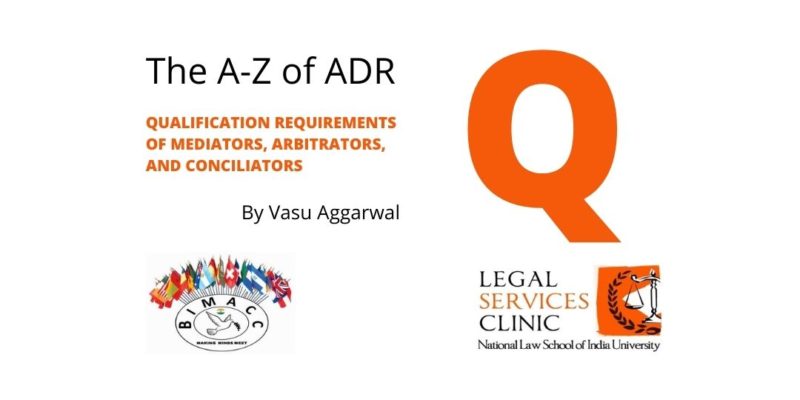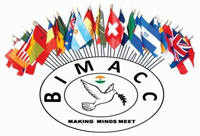
A-Z of ADR: Qualification Requirements of Mediators, Arbitrators, and Conciliators
-Vasu Aggarwal (IIIrd Year, NLSIU Bangalore)
When dispute resolution professionals are appointed, they are expected to resolve the dispute neutrally and impartially, conforming to all the procedures irrespective of the dispute resolution mechanism. The involvement of the dispute resolution professional may vary heavily in different dispute resolution mechanisms. An arbitrator is expected to understand the procedure agreed by the parties and adjudicate the dispute, whereas a conciliator is expected to suggest solutions to both the parties, whereas a mediator is only expected to facilitate conversation between the parties.
This article attempts to shed light on the required qualification requirements of Mediators, Arbitrators, and Conciliators in India.
1 Qualifications of Mediators
Although there is no Union law delineating the contours of how mediation is conducted, different High Courts have laid down rules under Section 89 of the Civil Procedure Code. These rules also lay down the required qualifications of the Mediators. The commonality in the required qualifications of the mediators in the different High Courts’ Rules can be found through the draft Alternative Dispute Resolution and Mediation Rules, 2003 (‘the Mediation Rules’) prepared by the Law Commission of India, pursuant to the Salem Bar Association vs. Union of India[1] judgment. The rules with respect to the qualification of Mediators are found in Part II of the Draft Mediation Rules.
Rule 4 of the Draft Mediation Rules lays out the required qualifications of mediators. There are four classes of eligible persons. First, the retired judges of Supreme Court of India, High Courts, District and Sessions, and City Civil Court or Courts of equivalent status. Second, the legal practitioners who have at least fifteen years of experience at the bar in the Supreme Court, High Court, or District Courts or Courts of equivalent status. Third, the experts or other professionals who have at least fifteen years of experience, or bureaucrats or retired senior executives. Fourth, the institutions expert in mediation that are recognized by the High Courts.
Rule 5 of the Draft Mediation Rules explicates the class of disqualified persons. There are five classes of disqualified persons. First, those who have a pending criminal charge, or have been convicted of criminal charge involving moral turpitude, or those adjudged as insolvent persons. Second, those who have pending disciplinary proceedings against them, or the disciplinary proceedings have resulted in punishment. Third, those who have a connection to the dispute in question, or one of the parties in the dispute in question are disqualified unless the objection is waived by both the parties. Fourth, any legal practitioner who has appeared for one of the parties in any of their dispute proceedings or suits. Fifth, any person who is disqualified by the High Court. Thus, in for disqualification, the logic seems clear—there must be little or no possibility of partiality.
The Draft Mediation Rules concerning qualifications and disqualifications have been adopted to some extent for court-annexed mediators by Karnataka High Court,[2] among other High Courts. However, there is no clear law with respect to the qualification requirement of mediators.
As per the Mediation and Conciliation Project Committee (MCPC) Training Manual of the Supreme Court of India, a person must have undergone 40 hours of the mediation training programme under the aegis of MCPC as per curriculum approved by MCPC from the trainers of Mediation and Conciliation Project Committee.
Private Mediation recognises the need for non-lawyers as mediators in disputes that require domain expertise and conduct training programmes for lawyers as well as non-lawyers. Institutions such as BIMACC are now conducting 45-hour training programmes along with universities as well as advance commercial mediation training programmes. In addition to the minimum 40-hour training programme, both court-annexed and private mediation centres conduct Continued Mediation Education (CME) Advance Training Programmes.
2 Qualifications of Arbitrators
Before the 2019 Amendment to the Arbitration and Conciliation Act 1996, there was no meticulous requirement of qualifications. However, there were three broad requirements. First, the arbitrator must possess the qualifications required by the parties, per their arbitration agreement. If the arbitrator does not possess the qualifications required by the parties, the arbitrator would be subject to challenge under S.11(b) of the Arbitration and Conciliation Act 1996. Second, there must be no circumstances that raise justifiable doubts regarding impartiality or independence of the arbitrator. The detailed grounds for justifiable grounds have been provided in Fifth Scheduled of the Arbitration and Conciliation Act. If there are such doubts raised, the appointment of an arbitrator can be challenged through S.11(a) of the Arbitration and Conciliation Act 1996. Thirdly, the arbitrator must be of sound mind and legally competent to contract.[3]
However, after the introduction of 2019 Amendments, there are more meticulous requirements. There are nine categories of people that can be appointed as arbitrator.[4] First, advocates within the meaning of Advocates Act, 1961, having 10-years of practice as advocates. Second, chartered accounts within the meaning of the Chartered Accountants Act, 1949 having 10-years of experience as a practising-chartered accountant. Third, cost accountants within the meaning of the Cost and Works Accountants Act, 1959 having 10-years of experience as practicing cost accountants. Fourth, company secretaries within the meaning of the Company Secretaries Act, 1980 having 10-years of experience as practicing company secretaries. Fifth, officers of the Indian Legal Service. Sixth, officers having a legal degree and 10-years of experience in legal matters in the Government, Autonomous Body, Public Sector Undertaking or at a senior level managerial position in the private sector. Seventh, officers with engineering degree having 10-years of experience as an engineer in the Government, Autonomous Body, Public Sector Undertaking or at a senior level managerial position in the private sector or self-employed. Eighth, the officer having senior-level experience of administration in the Central Government or State Government or having experience of senior-level management of a Public Sector Undertaking or a Government company or a private company of repute. Ninth, persons having an educational qualification at degree level with 10-years of experience in the scientific or technical stream in the fields of telecom, information technology, Intellectual Property Rights or other specialised areas in the Government, or Autonomous Body, Public Sector Undertaking or a senior-level managerial position in a private sector. Although it may appear that there is a vast variety of persons who may fall within these categories, it does disqualify certain persons.
There are other general norms that are applicable to arbitrators. There are eight applicable norms. First, the arbitrator shall be a person of general reputation of fairness, integrity and capable to apply objectivity in arriving at a settlement of disputes. Second, the arbitrator must be impartial and neutral and avoid entering into any financial business or other relationship that is likely to affect impartiality or might reasonably create an appearance of partiality or bias amongst the parties. Third,the arbitrator should not be involved in any legal proceedings and must avoid any potential conflict connected with any dispute to be arbitrated by him. Fourth, the arbitrator should not have been convicted of an offence involving moral turpitude or economic offence. Fifth, the arbitrator shall be conversant with the Constitution of India, principles of natural justice, equity, common and customary laws, commercial laws, labour laws, the law of torts, making and enforcing the arbitral awards. Sixth, the arbitrator should possess a robust understanding of the domestic and international legal system on arbitration and international best practices in regard thereto. Seventh, the arbitrator should be able to understand key elements of contractual obligations in civil and commercial disputes and be able to apply legal principles to a situation under dispute and also to apply judicial decisions on a given matter relating to arbitration. Eighth, the arbitrator should be capable of suggesting, recommending or writing a reasoned and enforceable arbitral award in any dispute which comes before him for adjudication.
Given the above requirements, the 2019 Amendments have been criticized because they add impediments to the parties’ autonomy in choosing the arbitrator for themselves.
3 Qualifications of Conciliators
In the case of conciliators, there is no rigorous requirement of qualifications. Similar to the arbitrator, the conciliator must be of age and sound mind, and legally competent to contract.[5] Second, the conciliator is appointed by either direct mutual agreement of the parties or indirect mutual agreement of the parties.[6] The conciliator must also be impartial and independent, and ideally, be of a different nationality than the parties.[7] Therefore, there are no heavy requirements such as in mediation and arbitration. However, in choosing any of conciliators, or mediators or arbitrators, the parties must exercise utmost care and caution.
4 Conclusion: Suggestions for Choosing the Right Professional
Parties must pay due caution to the independence and impartial nature of the Dispute Resolution Professional. The parties should refer to the history of the Dispute Resolution Professional, of both personal nature, in terms of positions held, and professional nature, in terms of disputes resolved earlier or the industry reputation.
Parties must also pay attention to the commitment that the dispute resolution professional can show towards the work. A dispute resolution process may be arduous, and those with no interest in them may not be able to provide the best results. Thus, the parties may look at the areas of interest of these dispute resolution professionals to be able to decide whether they would be able to commit well.
Parties may also look at other abilities i.e. interpersonal skills such as eloquence while deciding the dispute resolution Professional. Therefore, in conclusion, while there are some important qualifications and barriers that the dispute resolution professionals may be subject to, the party autonomy must be exercised carefully.
[1] AIR 2003 SC 189
[2] Karnataka Civil Procedure (Mediation) Rules, 2005.
[3] ‘ICA’ (Icaindia.co.in, 2020) <http://www.icaindia.co.in/icanet/rules/commercialarbitration/arbitration&conciliation/chapter1d.htm> accessed 12 August 2020.
[4] THE ARBITRATION AND CONCILIATION (AMENDMENT) ACT, 2019, s 14; Arbitration and Conciliation Act, 1996, sch 8.
[5] ‘ICA’ (Icaindia.co.in, 2020) <http://www.icaindia.co.in/icanet/rules/commercialarbitration/arbitration&conciliation/chapter1d.htm> accessed 12 August 2020.
[6] Arbitration and Conciliation Act, s 64.
[7] Ibid.
-Vasu Aggarwal (IIIrd Year, NLSIU Bangalore)
Vasu Aggarwal is a third-year student from the National Law School of India University (NLSIU), Bangalore.
BIMACC expresses its gratitude towards the author and to the members of the Legal Services Clinic, National Law School of India University (NLSIU) for their support in our collaborative efforts to promote ADR with this series titled “A-Z of ADR”. The purpose of this series is to increase the understanding of certain fundamental concepts of Alternative Dispute Resolution.
The Legal Services Clinic is a student-run committee that provides free legal services to the socially and the economically backward sections of the society who have difficulty accessing the judicial system. It also has a mandate of spreading legal awareness and providing free legal assistance to those who cannot afford it.
Website: www.legalservicesclinic.org/
Facebook: @legalservicesclinic
Email: lsc.nlsiu@gmail.com
Phone Number: 073586 73214
Disclaimer: The views and opinions expressed in this blog are those of the author and do not necessarily reflect the official policy or position of BIMACC, any of the members of the Board, or the empanelled neutrals. This blog is for informative purpose only and does not constitute legal advice in any manner whatsoever.
